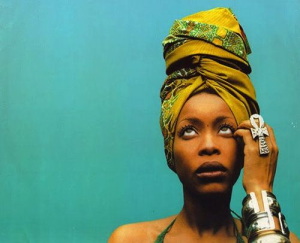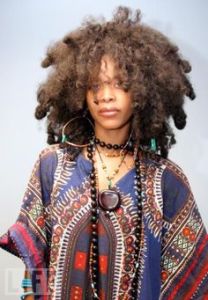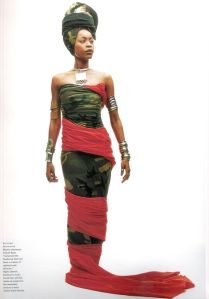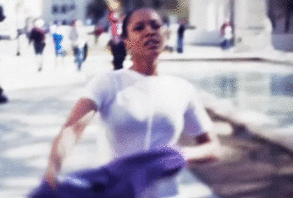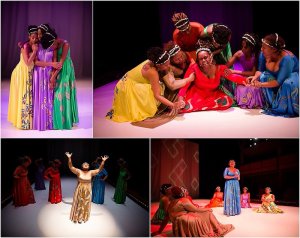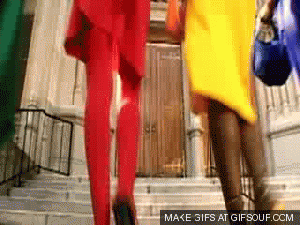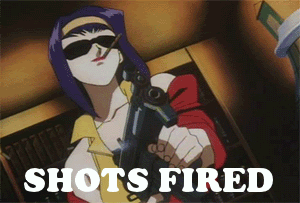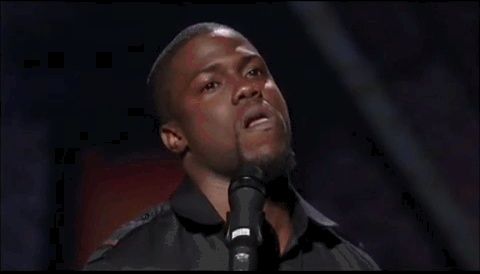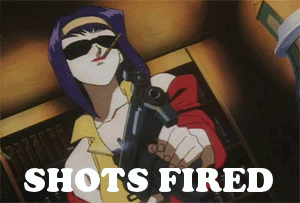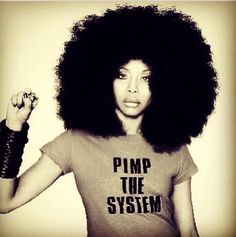The United States of America, that we’ve all grown to love and cherish, willingly caters privilege to a specific group in this country. The realness in me feels foolish to even state the blatant obvious but the writer in me urges to keep it “professional”. So I guess I’ll balance in the middle by stating the complete opposite… If you are black and if you are a woman living in America, privilege is something as rare as a neglected child feeling accepted in a foster home, the irony. If white upper-class male is what you presumed from the beginning, allow me to quote the always-profound OG Maco in saying…
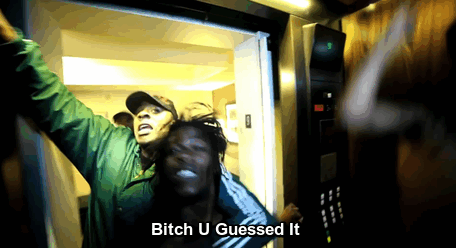
Black women have always been victims to discrimination on both ends of the societal spectrum (race and gender). Since the second-wave feminism of the 1970’s, several African American women have urged their black sisters to fight this double discrimination specifically by redefining themselves; by redefining the normative societal chokehold that has plagued and defined many black women for centuries.
Enter, the legendary Erykah Badu. A direct result of the second-wave feminism, Badu’s songs and music videos have made her a global icon for black women to look up to in the 1990’s, (which some refer to as the third-wave feminism).
Two societal aspects of renewal that are going to be covered in this analysis are 1. Self-love towards your body, she often questions the norm’s perception of beauty and 2. Romantic relationship issues with men. Her first two albums, Baduizm and Mama’s Gun, are the platform for this analysis.
1. Self-Love/Beauty
Badu’s Image
In a world where a majority of the media (magazines, television, etc.) commonly showcased, and preferred, the average clothing style of a white American person, Badu chose to wear afro-centric attire.
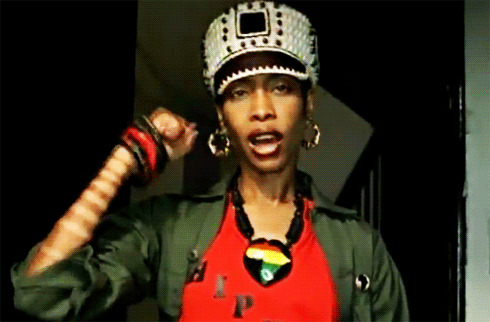
She constantly wore head wraps, African dresses and scarves, African jewelry etc. Badu is also known for wearing large dreadlock and afro wigs.
By glamorizing this afro-centric style in her videos and concerts, she gave young women a taste of their own history rather than the white American culture that they were accustomed to seeing on a daily basis. Badu touches on this subject, as a feature, on the Janelle Monae song titled Q.U.E.E.N. Monae, like Badu, defends and praises her unique style, while in the chorus referring to herself as “Queen” because of her style and ability to embrace her uniqueness, despite all the criticism directed towards her.
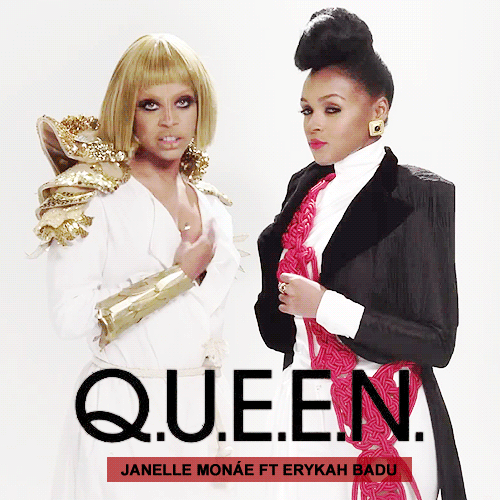
Badu adds to the track by saying that this song will provide the path to freedom because we [black women] have been droids for too long. This positive message sent to black women encourages them to redefine themselves by rejecting those one-dimensional perceptions of style that they’ve been bombarded by and embrace their own.
Language
Audrey Lorde in her book Sister Outsider says…
I had to make contact with other women while we examined the words to fit a world in which we all believed, bridged, our differences, And it was the concern and the caring of all those women which gave me the strength and enabled me to scrutinize the essential of my living.
Another way Badu deviates her black listeners from the predominately white experience is her use of Ebonics in music. When searching Badu’s lyrics online, enough is spelled enuf and your is spelled yo. Aside from the spelling, one could clearly note the pronunciation of these words in her music. Lyrics like See I picks my friends like I pick my fruit & Ganny [granny/grandmother]told me that when I was only a yut [Youth] clearly reinforcing black culture with the use of its vernacular. She also uses the word nigga from time to time in her music. This Pathos method of using the everyday language of black communities further allows her to connect with her audience.
body (CLeva/Window Seat)
I woke up like diiss: the words spoken proudly from this generation’s most-known advocate for black womanhood through music, Beyoncé. Her song “flawless” is an anthem for women to embrace how they naturally look. This brings me to one of the main topics of redefinition that Badu showcases in her music: questioning American society’s perception of beauty of the female body through self-love and acceptance.
Badu’s song “Cleva” (Clever) from her sophomore album Mama’s Gun opens with:
This is how I look without makeup. And with no bra my ninny’s sag down low. My hair ain’t never hung down to my shoulders. And it might not grow, shit. You never know.
Despite the usual accessories women place on their bodies, which includes Badu’s afro-centric accessories (hair and jewelry), she exposes her naturalness to her audience. Although Badu indulges in her humanness, the verses purposely contain lyrics that mislead the listeners; such as, Nowadays my figure aint so fly.
Once the chorus hits, however, Badu says despite her physical appearance, her possible low self-esteem towards her body, and other’s perceptions of her appearance, she is intelligent (Cleva). She claims that intelligence is the most important thing at the end of the day, another message she wanted black women to take away from her art.
While most music videos, including those of some black women performers, exacerbate the exploitation of the black woman’s body and perpetuate stereotypes of black womanhood, Badu, Elliott, and Hill depict themselves as independent, strong, and self-reliant agents of their own desire, the masters of their own destiny.
– Rana A. Emerson – Where My Girls At?”: Negotiating Black Womanhood in Music Videos
Because of the male dominated society, on both ends of the racial spectrum, black women barely felt like they had a voice until musical, and even visual, artists like Badu brought the idea of self-love to the public. I mean, who could forget the jaw-dropping music video for Window Seat.
In the video she walks through her hometown Dallas, Texas stripping bits of her clothing until she is eventually naked and “killed” at the assassination site of John F. Kennedy. Badu’s intentions of the video suggest that courage is needed to evolve and layers of you have to be peeled in order to achieve it.
She also says the video was a protest to the psychological term called groupthink. The idea of groupthink says that people tend to gather in the norm and criticize (or assassinate, in the video’s context) anyone who is different.
Badu says she was terrified while filming because she is not completely in love with her body (a problem many women experience). As expected, Badu was criticized heavily for exposing her body in public which she responded by saying: people have a hard time processing it when it is not packaged for the consumption of male entertainment. She claims the positive message of her video is completely neglected and sexualized because of the taboo perception of nudity.
Now, how can you argue with that?
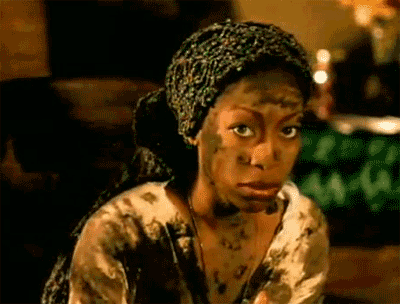
2. Romantic Relationships with Men
Mistreatment (CERTAINLY)
Who gave you permission to rearrange me? Certainly not me. Who told you that it was alright to love me? Certainly not me…
This bold excerpt is tenaciously embedded in Erykah Badu’s debut album Baduizim, title track: Certainly. In this song she thematically puts together a triple entendre. In doing so, Badu cleverly perpetuates the theme of someone inflicting change without permission.
 You tried to get a little tricky, turned my back and then you slipped me a mickey.
You tried to get a little tricky, turned my back and then you slipped me a mickey.
1. The female protagonist in this song condemns her ex-lover, who has done wrong in her eyes She feels angry at the fact that a man came into her life and altered who she is. Metaphorically that is exactly what the “mickey” (date-rape drug) represents, another form of mistreatment and abuse. In a literal sense, the song embodies the protagonist’s frustration after being drugged and (possibly) sexually abused.
2. On a grander scale, this song generally summarizes the first meaning. Therefore the song exhibits black women’s anger after having their pride and respect taken away from a variety of men in society. Whether it’s through labor, romantic relationships, or civilian rights, men have created a world where a black woman’s worth is stripped away from her.
3. As clarified at our good friends at http://genius.com/, Badu initially intended this song to be about the stolen identity of slaves in the U.S. The protagonist, now being Africans, rebukes Americans for mistreating them and forcing them to change their customs and beliefs.
In the bridge of the song Badu says You know that the world is mine, the idea of afro-centrism now being present in her lyricism. Toward the end of the “flipped it” version of the song she says
You know that the world is mine when I wake up. I don’t nobody telling me the time, no! The world is mine, mine, mine, mine. I don’t need no nigga, rollin over, looking after me!
Basically stating that once black Americans (or black women, in the other scenarios) become conscious (wake up) they will overcome their oppressed state and prosper in the world. All it takes is that redefining moment of consciousness.
Let it go(Bag lady)
This song instantly reminds me of author Ntozake Shange’s classic For Colored Girls who have Considered Suicide When The Rainbow is Enuf. One of the soliloquies encompass a very sassy and sarcastic character (lady in green), purposely acting oblivious by stating “somebody almost walked off wid alla my stuff”. In this story, she accuses her male counterpart of taking away her “stuff”. Metaphorically meaning, the woman has given all of herself (like her pride and trust) to her lover yet receives no respect from him; creating an altered version of her like in Certainly.
Badu channeled her inner Shange in the music video Bag Lady, off of Mama’s Gun. Badu and her back-up singers are each individually dressed in yellow, blue, green, purple, and red dress (an obvious reference to “For Colored Girls…”)
Unlike “Certainly” and “Q.U.E.E.N”, Badu sings directly to a woman (rather than being the first person perspective narrator) who is negatively effected by her past relations with men. This effect allows Badu to literally speak to the black women in America burdened by this scenario.
Interestingly enough, the instrumental is the same as the Dr. Dre song Xxplosive. Let’s take a look at some lyrics from Dre’s song shall we?
Fuck a bitch; don’t tease bitch, strip tease bitch
Eat a bowl of these bitch, gobble the dick
Hoes forgot to eat a dick can shut the fuck up!
Gobble and swallow a nut up, shut up and get my cash
Backhanded, pimpslapped backwards and left stranded
Just pop ya collar, pimp convention hoes for a dollar
…Lovely.
Badu takes that instrumental and makes the complete opposite, almost as if she was responding to Dr. Dre’s song.
At the end of the song she says for my grocery bag ladies, for my Gucci bag ladies, showing that this applies to all women, rich and poor. Badu advises these women to let it go, as it will not only harm your future relationship with another man but also the overall relationship you have with yourself. I guess nobody ever told you, all you must hold onto is you, is you, is you.
Badu throughout the entire song emphasizes the size of the bag as a constant metaphor. Badu claims the heavier the bag, the more restricted you are to move freely; basically insinuating, the more stuck in the past you are, the more stuck you are going to be in the present and future.
Bag Lady’s music video bridges the gap between the generation of women in the 70’s and the 90’s by adding the Shange element. It’s a pretty smart move considering that both generations went through the exact same struggles. Check out the visuals:
Some great scenes to looks at:
- :52 – Badu shows women intensely reading certain books close to their faces. Some of the titles read “Quick thick Hair” and “How to get over him yesterday”, all problems that black women go through and hope to find solutions to.
- 1:43 – Badu visually shows men rejecting women because of their “extra baggage”. With the line One day, he gon say, you crowdin my space cosigning the scene in video.
- 3:00 – The change in scene displays the braggadocios Booty instrumental playing in the background. The women (all with some interesting titles) are all wearing black and showing off some amazing 007 moves.
Kick him out (Tyrone)
Im getting tiiiiired of yo shiit…
Who can forget the classic Tyrone? Way before the current internet sensation who claims he’ll “fuck you wife, long dick style”, there was this unforgettable song. I’ve always credited the sassy and witty approach for making it one of Badu’s most memorable songs. The central character in this song is furious with the way her relationship is going and demands her lover to call his friends to “pick up all yo shit”.
What makes this song this song special is the fact that this character takes it upon herself to throw him out of her life, unlike “Bag Lady” and “Certainly” which leaves the question of who ended the relationship completely ambiguous. The self-dependency and blatancy of “Tyrone” makes this a classic for many black women who have ever felt neglected by their lover.
Now, every time I ask you for a little cash. You say no but turn right around and ask me for some ass. Oh well, hold up, listen partner, I ain’t no cheap thrill.
Or towards the end of the extended version of Tyrone where she says get up of your knees and hands or So, tell your boys at the licor store that you gon’ need a place to go. I don’t care but you gots to leave.
This shows the emergence of powerful black women that we have seen all to well in the 90’s…

This song plays really well at her live concerts. In fact, this song was released as a single through her live album titled Live, where women were going insane.
Peep how she sets up all the men in the audience. She says, Brothas how ya feel? *Cheering* … Let’s see how ya groove to this. The immediate first line ? Im getting tired of yo shit.
The women went nuts. They were cheering and clapping throughout the entire song while dudes in the audience were probably sitting there like…
Another important line would be It’s gettin’ late, no time to wait. You need to go on so I can meditate. Meditation has always been regarded as a form of self-cleansing and self-empowerment, yet again redefining herself.
And to add insult to injury she ends the song with the classic line… But you can’t use my phone.
Erykah Badu resembled perfectly the new wave of feminists that emerged in the 1990’s. She often calls herself an “analog girl in a digital word” With a stylistic voice approaches of older jazz heads like Ella Fitzgerald or Billie Holiday mixed with the word usage of Ntozake Shange and Alice Walker, Badu truly stands out in the industry, because of her “old sound”. She also relates to generation of the late 90’s/early 00’s by her Terry McMillan themed lyrics and Hip Hop/R&B influence in her instrumentals. For the first time black women were empowered enough to kick their men out of the house and take command of their own household. That was something rarely seen in the history of the world until then. Certain black women were applauding their ideas and use their art as stepping stone for other women to follow. Badu certainly fit the image as she urged black women to redefine themselves by channeling insecurities and obstacles in order for their transformed lives could live in a clearer future.
Bravo, Miss Badu…Bravo.
